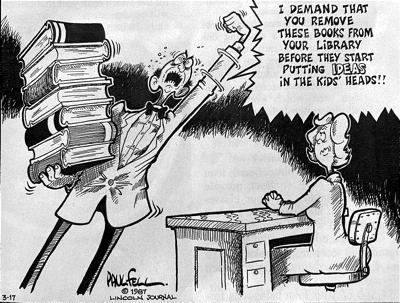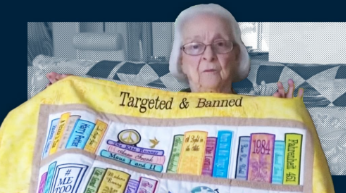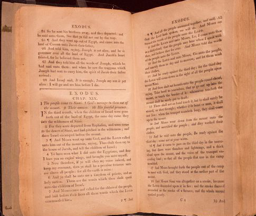Book selection, censorship, and challenges
Book selection, censorship, and challenges
Censorship is to cut access from a book and information to people who may need it.

Introduction
- Introduction
- Teaching and selection of materials
- Selection checklist to evaluate literature materials
- Amy's guidelines for requests to remove materials
- Request Form to reevaluate media for exclusion
- Some censored media
- History of book & library burning
- ALA challenged books by years
- Nebraska bill to notify parents of their child's library check-out
It is essential for people to access, gather, analyze, evaluate, and use information, in all forms of media, to express cultural, personal, social, political, environmental, and aesthetic values and ideas to make good decisions, not only to survive, but to create meaningful productive lives.
However, not all books are appropriate for all!
Therefore, decisions need to be made for all of us to know: how to seek and select information, when information is valid and appropriate, when to inquire and express our judgments, when to respect theirs and others views, when to assert our right of assertion, what to appreciate, how to set and achieve appropriate goals, and how to be responsible citizens in a liberal democracy.
If learners are not able to control their use of information, then more powerful people will control the information they receive to reign over them. Those who control information control the power to know. Control by limiting what is knowable and by not knowing alternatives and limiting the right to make different decisions.
Historically, people considered censorship as removing or limiting information. However, with the onset of viral deception (fake news) and electronic dispersal (bots) of information and misinformation, censorship must now consider both the limiting of information or providing too little information as well as providing vast amounts of misinformation.
Therefore, the ability to censor viral misinformation and deception, that threatens security, becomes as important as the ability to not censor ideas in books, movies, news, and art that are needed to make good moral decisions that do not threaten our security, but enrich our lives and maintain our survival.
Never too old to fight for freedom of speech!

Centurion makes a quilt and presents it to her school board.
Eight year old understands importance of not banning books
The ABCs of Book Banning with Sheila Nevins, Peter C. Harvey, and Jill Twiss
Debut: Date and Time Tuesday, November 28, 2023, 7 - 8 PM & on Paramount+

Rise in school censorship during 2024-2025.
Source NEA Today. January 2026
Teaching and Selection of Materials
Teachers, are bound to have someone challenge a book or materials in their classroom. In fact some people believe if you don't have someone challenge a book every once in a while, then you are not doing your job in selecting a good variety of quality literature.
However, a teacher needs to understand the community in which they teach and recognize that even the most liberal of communities has limits on what they believe children and adolescents should be looking at or reading. A very important thing to consider along side the controversial issue a story might create is the socially redeeming qualities or themes the story has. For example - A Bridge to Terabithia. Includes some words that some parents would or have complained about. However, I and others have been able to convince most parents and students the use of such words were appropriate or at least plausible within the context of the story.
A good source for such related ideas can be found on the NCTE (The National Council of Teachers of English website. For example the following excerpt from this site for the book Bridge to Terabithia illustrates this point.
"Bridge to Terabithia is an excellent novel for boys and girls ages nine to twelve because it deals with real life situations and problems that many children in the nine to twelve age group find difficult to cope with. Paterson is praised by many critics for creating a realistic boy-girl friendship, something "so curiously unsung in literature" Christian Science Monitor (1978, p. B2.) One of the stronger subjects Paterson presents in Bridge to Terabithia is death. Yet Paterson presents death in a very sensitive manner that should not prove controversial to the readers. Another character briefly introduces the subject of child abuse and again Paterson presents this issue in a very knowledgeable and realistic format that the young adult reader would not find objectionable."
I used this book, as a read aloud, with my students years ago. In the class was one girl that commented on the language used by Jess when he was grieving over the lose of Leslie. I asked her if she would be upset if she lost a friend; and while she might not say those words, could she imagine others might, or at least think them.
When she agreed, I suggested the author chose those words for emphasis; and asked her how she might suggest another way to create a strong emphasis for the emotions the author was trying to communicate. Her response was to look me in the eye, smile, say "Oh", nod agreement, and add, "Yeah, I can see that." and walk away smiling. I kind of expected a phone call after that, since that was often the pattern with this particular family, but it never came. Not for that incident.
We need to be careful that we honor parent's requests, but at the same time we can't let a minority group change what other parents expect their children to experience in school.
The Witch of Blackbird Pond is another book that has been removed from book lists by assertive parents because of content dealing with witchcraft and because the main character is headstrong and not respectful of adults. Fortunately, I never had complaints about it when I read it aloud. I mention it because, just the other day, when I was at the Wayne Rec. Center walking in circles, I saw a girl glued to a copy, from the Wayne Middle School, sitting on the bleachers reading the whole time I was walking. Others, whom she usually played pickup games of basketball with, couldn't convince her to stop reading and play ball. A great book is timeless; and thankfully for her it hasn't been censored in her school.
A selection checklist can be useful to guide decision making of materials.
Selection checklist to evaluate a piece of literature or story
Title:
Media type:
| Characteristic | Yes | No | Reason why |
|---|---|---|---|
| Provides language enrichment | |||
| Use of natural dialog | |||
| Empowers the learner | |||
| Provides individual needs | |||
| Includes thoughtful and sensitive responses to conflict | |||
| Significant theme for the audience | |||
| Plausibility of plot | |||
| Interesting characters | |||
| Plot is adequately supported | |||
| Good information to support the story | |||
| Good use of figurative language | |||
| Meaningful use of language | |||
| Logical character interactions | |||
| Story unfolds from the global to specific | |||
| Simple enough for students to read and comprehend individually | |||
| Worth the investment of time | |||
| Developmentally appropriate | |||
Amy Tichota suggests guidelines for requests to remove materials
As teachers, we need to remember that we need to remain calm when something that is in our classroom is challenged. A simple conference with the challenger may solve the problem. However, sometimes it is not this simple. An important thing to remember is to deal with only one book at a time. This will limit any challenge and make it more controllable. There are three guidelines that can be remembered when book challenges are made:
- materials selection policy,
- grievance procedure, and
- steps to reduce emotional tension.
A selection policy helps by adding a layer of rules and involvement of others so that when books are chosen, the selection is made under the rules and guidelines and involve a group of people, usually a selection committee that makes or agrees to recommendations of a selection. It is always comforting to have others in agreement with your decision whether there will be others who do or do not.
A grievance procedure is the process an individual must use if he or she wants to formally challenge the use or availability of a book. It must always include a signature and explanation for the action being requested. A designated committee will then consider the complaint. A final decision is then made by the school or library. If the decision is not agreeable, the individual who complained may choose to seek legal counsel and request a hearing in court.
Last, the teacher and other representatives for the school or library need to continually strive to keep all parties from becoming emotional. This can be done by first listening to the person who has the complaint and attempt to resolve it at an informal level. It is sometimes helpful to describe the approval process used for the selection with reference to the required policy and procedures.
One benefit of the policy and procedure for selection of books and complaints about books is to protect both parties. By calmly explaining that no decision can be made without going through proper channels, or to change previous decisions to use or not use certain titles is not a personal decision, but requires certain rules or procedures be followed. Such statements made matter of fact can reduce emotional and biased decisions. Emotional responses can also be reduced when additional people are brought into the process so that additional ears and minds can listen and respond better to both parties to keep everyone calm and honest. If nothing can be resolved informally, then the person who is challenging the book can be told they will need to complete the appropriate forms to make a formal request to challenge a specific book.
Literature that people have attempted to control has included: books with profanity, unhappy endings, drug use, stereotypes, use of politically incorrect language, religious related ideas, and questionable images. Sometimes literature is questioned with a narrow focus say on the use a particular word one should enlarge the focus and look at the whole book. How does the use of a certain word fit with the overall story. Is it used for a redeemable reason? If the book has a sad ending, are there more books in the library with happy endings? Often more choice is a better option, rather than less choice. If we want students to learn how to make good choice, then we need to provide them with real world choices to learn how to make them.
Concluding thoughts
While it may not seem reasonable there could be agreement with the challenger. It is most certainly likely they believe the type of media they are challenging (book, video, or other) has extreme power. They must believe in this power, since the are concerned the material will negatively change a person's mind.
It seems logical to believe if books, or media, have a power to change and save people, then they also have the power to fail or destroy them. Therefore, exposing people to ideas, they might not encounter on their own, brings a fear of negative indoctrination.
Indoctrination has four main components: intent, content, method, and outcome, which is imposed on a learner without their critical evaluation. A piece of literature may be considered as an author's intent to indoctrinate a reader or viewer with information, however, that is not the intent of public education or public school teachers. For them, each piece of literature is but content. Content, to share with the intent of presenting different ideas or perspectives among many. With a method to provide comprehensive and diverse information to study to make informed decisions with critical thinking to enable students to achieve the tools necessary to be citizens in a democracy that cares for and protects all its citizens. Diverse ideas and opportunities matter and those who act to limit them, hurt people. An act, which must be considered a problem, that needs to be dealt with, not ignored.
Request Form to reevaluate media for exclusion
Description of the material
Author
Title
Publisher
Date of publication
Type of media (printed book, video, magazine, pamphlet, instructional material, ...)
Request initiation
Person making the request
Phone
Address
City
Zip code
Address of building(s) where material is/are used
If request is supported by a group or organization, include the following information.
Name of group
Address of group
Group resolution or other action by the group. Describe kind of action and attach supporting minutes or other exhibits.
Describe what was reviewed. (pages, minutes in video, or other description)
Describe specifically what part you object, where it is located, why you object, how it might be harmful to students, and what value it might have to students.
Object to:
Located:
Reason:
Harm:
Possible value:
If there is support from other experts in a field related to the objectionable media, include their objection and rationale.
If this material is removed, then what other material would you recommend to replace it that would be better for the intended purpose.
Do you want to present your request in person. Yes No. If yes, you will be contacted at the provided location with a date and time.
Signature
Date
Censored media
Books
 Slave Bible. Passages were omitted related to freedom, slave uprising, and rebellion like: Moses exodus from Egypt. And emphasis put on serving. For whether is greater, he that sitteth at meat, or he that serveth? Is not he that sitteth at meat? but I am among you as he that serveth. Luke 22:27 Source
Slave Bible. Passages were omitted related to freedom, slave uprising, and rebellion like: Moses exodus from Egypt. And emphasis put on serving. For whether is greater, he that sitteth at meat, or he that serveth? Is not he that sitteth at meat? but I am among you as he that serveth. Luke 22:27 Source- Adventures of Huckleberry Finn. by Mark Twain
- Anne Frank: The Diary of a Young Girl. by Anne Frank
- Arabian Nights
- The Call of the Wild. by Jack London
- The Grapes of Wrath. by John Steinbeck
- Gulliver's Travels. by Jonathan Swift
- I Know Why the Caged Bird Sings. by Maya Angelou
- James and the Giant Peach. by Roald Dahl
- A Light in the Attic. by Shel Silverstein
- Of Mice and Men. by John Steinbeck
- The Scarlet Letter. by Nathaniel Hawthorne
- To Kill a Mockingbird. by Harper Lee
- Uncle Tom's Cabin. by Harriet Beecher Stowe
- A Wrinkle in Time. by Madeleine L'Engle
Music
In 1960, after the FDA approves the first birth control pill, Loretta Lynn writes and records her popular hit, The Pill, about the daily injustices of married women's lives. It is banned by many country music stations.
History of book & library burning
Books and libraries have been attacked for thousands of years.
An early example is Chinese emperor Qin Shi Huang (of terracotta army in Xian fame) in 213 B.C.E. ordered a book burning. Historian, Lois Mai Chan, writes:
His basic objective was not so much to wipe out these schools of thought completely as to place them under governmental control.
Books of poetry, philosophy and history were specifically targeted, so the new emperor couldn't be compared to more virtuous or successful rulers of the past.
The result is: history suffered a great loss.
Another big cause of book burning is war and conquest.
A notable early example was the destruction of the Library of Alexandria in Egypt, which was burned multiple times, 48 B.C.E. by Caesar and 640 A.D. by Caliph Omar.
Later examples include the destruction of the
- U.S. Library of Congress during the War of 1812
- Many libraries destroyed across Europe during World War II
- Mao Zedong in China with his Cultural Revolution and more recently the
- Jaffna Public Library of Sri Lanka, burned by Sinhalese Buddhists.
Controlling people, by eliminating the source of different ideas in books, has been a theme in literature, like in Ray Bradbury's Fahrenheit 451.
While the printing press and Internet has increased the availability of books and other media, there are still many issues of availability and preservation so everyone who desires access, has it to all ideas.
Censorship related to sex education literature & curriculum

Mary Ware Dennett is arrested in 1929 for mailing her The Sex Side of Life: An Explanation for Young People, which she wrote in 1915 to inform her son, friend's families, and others about the human body and sex. She was charged with violating the 1873, Comstock Act. Over the years she fought legal battles and led a public relations campaign for freedom to communicate fully about the body and exercising their right to free speech. In 1930 the United States Supreme Court ruled in here favor in the United States v. Dennett.
Today, years after Dennett's arrest, titles dealing with sex continue to top the list of the American Library Association's most frequently challenged books. Sex education hasn't fared much better. As of September 2021, only 18 states require sex education to be medically accurate, and only 30 states mandate sex education at all. The U.S. has one of the highest teen pregnancy rates of all developed nations. Source
In 1960, after the FDA approves the first birth control pill, Loretta Lynn writes and records her popular hit, The Pill, about the daily injustices of married women's lives. It is banned by many country music stations.
American Library Association's most frequently challenged books

If you can't censor, then wear them down in bureaucracy?
Nebraska Legislature advances bill requiring schools to tell parents about checked-out books
LINCOLN — The Nebraska Legislature gave first-round approval last week to a measure requiring school districts to notify parents and guardians about the books their children check out from school libraries.
Legislative Bill 390 from Sen. Dave Murman of Glenvil, which advanced with 25 votes — the minimum needed — also would require school districts to set policies that allow those "educational decision makers" to access the library catalog.
Murman, chairperson of the Legislature's Education Committee, said the bill rehashes existing state law that allows parents to see what materials are available in the schools but would provide further transparency to parents.
"Different families have different values, so parents should have that oversight in their kids' lives," Murman said. "That being said, the opportunity for parental involvement is limited without clear parental transparency measures."
Opponents of LB 390 said Murman's bill was unnecessary and amounted to an unfunded mandate passed down from the Legislature to public schools.
State Sen. Megan Hunt of Omaha said LB 390 required schools to conduct surveillance on students by requiring teachers and librarians to notify parents about the books their children are reading.
The bill would not improve educational outcomes for Nebraska students, she said, but could put some students in danger, particularly LGBTQ students who had not come out to their parents yet.
"This is not something that we need to do," Hunt said. "I think it's busy work. It's chores. It's us meddling in the work of people who already know what they're doing."
Lincoln Sen. Danielle Conrad, who voted to advance the bill from the Education Committee, said LB 390 was "a garden variety policy directive bill" that provided direction from the state while allowing local school boards to tailor policies that fit their needs.
Conrad said she preferred Murman's bill to a measure considered last year that would have made K-12 educators subject to criminal penalties if they provided material to students deemed obscene.
The bill from former Sen. Joni Albrecht of Thurston would have removed from state statute a defense teachers could raise in court — and that juries could ignore — but it fell three votes short of overcoming a filibuster.
"Schools already have very thoughtful policies in place in regards of material that will be available at the school that meet community standards, that meet the academic needs of the students, that are age-appropriate, that have been vetted," Conrad said.
She added schools also have processes in place for parents to seek to remove those materials — mechanisms that have been used more in recent years — as well as options for parents to opt their students out of parts of the curriculum they disagree with.
Other senators said they also opposed the Legislature opening the door for parents to object to books or material that others may not find objectionable for their students.
Omaha Sen. Machaela Cavanaugh said the Legislature should focus on other policies that would help students succeed, including expanding school lunch programs, better Wi-Fi, and ensuring more Nebraskans have housing.
"Sometimes we feel like we have to do something because it's in front of us," Cavanaugh said. "We don't need to do this. I can ask my school what books they have. It doesn't need to be legislated."
Source Omaha World Herald Sunday March 15, 2025
Resources
Home: Literacy, media, literature, children's literature, & language arts